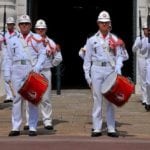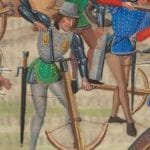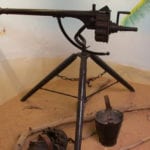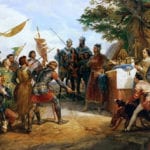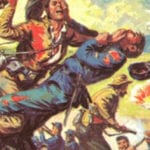 Our World
Our World  Our World
Our World  Crime
Crime 10 Dark Details of the “Bodies in the Barrels” Murders
 Animals
Animals The Animal Kingdom’s 10 Greatest Dance Moves
 Movies and TV
Movies and TV 10 Box Office Bombs That We Should Have Predicted in 2025
 History
History 10 Extreme Laws That Tried to Engineer Society
 History
History 10 “Modern” Problems with Surprising Historical Analogs
 Health
Health 10 Everyday Activities That Secretly Alter Consciousness
 History
History Top 10 Historical Disasters Caused by Someone Calling in Sick
 Animals
Animals 10 New Shark Secrets That Recently Dropped
 Movies and TV
Movies and TV 10 Forgotten Realities of Early Live Television Broadcasts
 Our World
Our World 10 Places with Geological Features That Shouldn’t Exist
 Crime
Crime 10 Dark Details of the “Bodies in the Barrels” Murders
 Animals
Animals The Animal Kingdom’s 10 Greatest Dance Moves
Who's Behind Listverse?

Jamie Frater
Head Editor
Jamie founded Listverse due to an insatiable desire to share fascinating, obscure, and bizarre facts. He has been a guest speaker on numerous national radio and television stations and is a five time published author.
More About Us Movies and TV
Movies and TV 10 Box Office Bombs That We Should Have Predicted in 2025
 History
History 10 Extreme Laws That Tried to Engineer Society
 History
History 10 “Modern” Problems with Surprising Historical Analogs
 Health
Health 10 Everyday Activities That Secretly Alter Consciousness
 History
History Top 10 Historical Disasters Caused by Someone Calling in Sick
 Animals
Animals 10 New Shark Secrets That Recently Dropped
 Movies and TV
Movies and TV 10 Forgotten Realities of Early Live Television Broadcasts
10 Military Gambles That Dictated The Fate Of Nations
Every battle can be considered a gamble. However, sometimes commanders bet against incredible odds in ways that go beyond simple strategic daring. The results of such enormous rolls of the dice, win or lose, have been decisive turning points that have altered the course of history. Below are 10 of these momentous gambles.
10 Marathon
490 BC
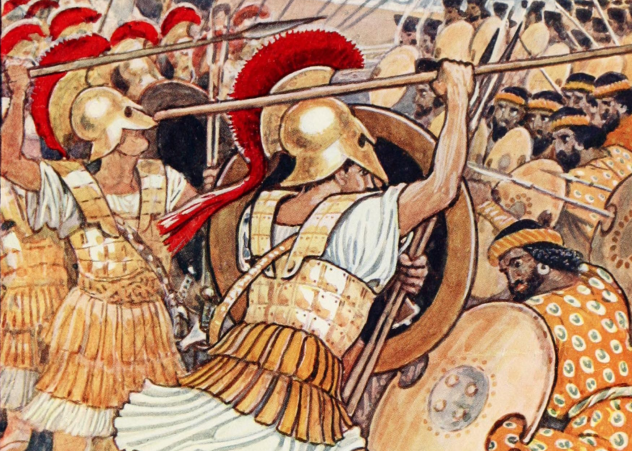
The Persian Empire was the mightiest force that the ancient world had seen up to that time. After conquering the kingdoms of Media and Lydia, King Cyrus tried to impose Persia’s heavy-handed rule on the Greek cities of Asia Minor. The liberty-loving Greeks resisted this oppression by walling up their towns and preparing for war. Cyrus died before managing to pacify the unruly Greeks, but his son, Darius, decided to bring the war to Greece itself. Darius was especially angered by Athenian support of the Greek revolt. Athens was the prime target when he commenced his invasion in 490 BC. The desperate Athenians, unable to gain allies who would dare confront the Persians, stood alone as their outnumbered army arrived to block the enemy advance on the field of Marathon.
Miltiades, the Athenian commander, realized that the only way to overcome the one-to-three disparity in numbers was to catch the enemy while they were still disorganized. He therefore ordered a charge on the Persian ranks at dawn. The Greeks stormed the 1.6-kilometer (1 mi) distance between the armies at breakneck speed, without support of cavalry or archers. Beholding the suicidal charge, the Persians thought the Greeks had lost their minds. They routed the Greek center and pursued the retreating units. It was then that the Athenian flanks fell upon the Persians, scattering their overextended ranks and forcing them into a full retreat. Athens was saved.
While it is easy to exaggerate the importance of the victory of democratic Athens over Persian despotism, without it, European civilization would no doubt have been vastly different. The annihilation of Athens would have meant that Western ideals of freedom, culture, and philosophy would not have developed in their present form.
9 Gaugamela
331 BC
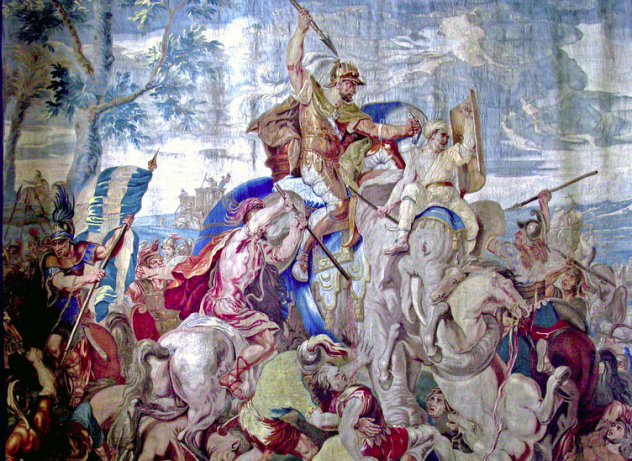
Upon his ascension to the Macedonian throne, Alexander the Great promised the Greeks revenge upon the Persians, who had ravaged their homeland. Personally, it was his ambition to supplant that great empire with one of his own. Beginning in 334 BC, Alexander’s career of conquest took him ever deeper into Persian territory. King Darius III prepared to meet him on ground of his own choosing, where he could deploy his cavalry to advantage. The site Darius selected was the plain of Gaugamela, which is modern-day Irbil, Iraq. With a vast force of an estimated 90,000–250,000 men, Darius was confident of victory over Alexander’s 50,000.
Overwhelmed by the size of the enemy, a jittery General Parmenion proposed a night attack. Alexander dismissed the idea, saying, “I will not demean myself by stealing victory like a thief. Alexander must defeat his enemies openly and honestly.” The plan Alexander devised instead was to smash his numerically inferior force head-on against the Persian center rather than outflank the enemy. He believed that if he could break the center, the rest of Darius’s army would disintegrate. Alexander relied heavily on his phalanx, which was armed with 4-meter-long (13 ft) spears called sarissas, making it impenetrable to Darius’s cavalry. When battle was joined in the morning, Alexander’s right wing veered off as if to make an outflanking maneuver. Darius’s attempts to contain it opened up a gap in his center. Alexander made a brilliant about-face maneuver to charge the gap, catching the Persians off balance. As his center dissolved, Darius panicked and fled.
The Greek victory ended the Persian Empire, and Greek culture would spread across the known world. The influence of Greek politics, art, architecture, science, and literature can still be felt today.
8 Caesar Crosses The Rubicon
49 BC
![]()
The Rubicon was a small stream, easily crossed on foot, which served as Rome’s northernmost boundary. An ancient law forbade any Roman general from crossing it into Italy while at the head of his army. To do so was treason, a crime punishable by death. In 59 BC, the ambitious Julius Caesar was made consul along with Pompey and Crassus—the First Triumvirate. Caesar became governor of Gaul, where he proved his military and administrative skills in subduing the native Celts. As his popularity grew, the Senate and Pompey began to look on him as a threat to their power. The Senate ordered Caesar to resign his command and disband his army.
Caesar could either return peacefully to Rome, securing a second consulship and a new provincial command, or ride the wave of his popularity and challenge the Senate and Pompey. The latter would place him at risk of being denounced as an enemy of the state and would also plunge the Roman Republic into civil war. Proclaiming, “The die is cast!” Caesar chose to disobey the Senate and crossed the Rubicon into Italy.
The odds were, for the most part, stacked against Caesar in the war with Pompey. Pompey had withdrawn to Greece and could summon all the resources of the east against his enemy. In the west, Pompey also controlled the Spanish provinces. Caesar did not even have ships to pursue the Second Consul. Pompey could also absorb losses without greatly damaging his prestige, while it could only take a single, serious defeat to topple Caesar from his wobbly pedestal. Caesar had to keep winning against an enemy with greater resources, always gambling on speed to catch the enemy unprepared. The campaign of 48 BC was touch-and-go for Caesar. In the end, Caesar’s superb generalship overcame the Pompeiian forces in the decisive battle of Pharsalus. Pompey fled to Egypt, where he was killed.
Caesar’s triumph laid the foundation of the Roman Empire over the ashes of the Republic. The Empire provided the political and institutional framework upon which modern European states were built.
7 Julian’s Invasion Of Persia
AD 363
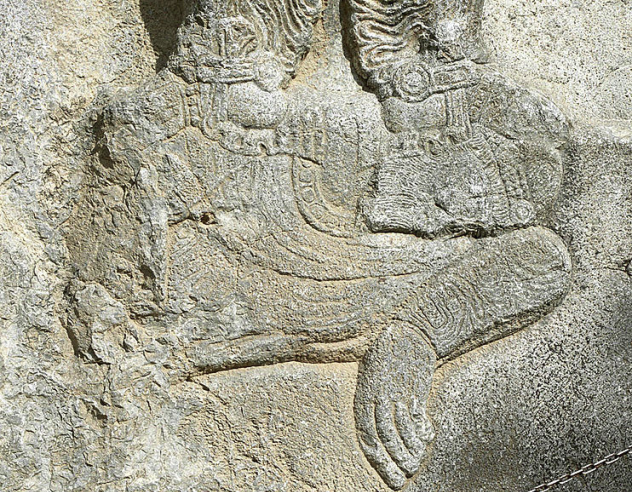
Raised a Christian, the Roman emperor Julian renounced his faith when he was barely out of his teens and embraced paganism, hence his sobriquet, “the Apostate.” He was an administrative genius who sought to reform and strengthen the empire. He was a talented and likable fellow with a great sense of humor. Julian attacked Christianity, but not through bloody persecution. He simply restored paganism to equal footing with the upstart religion while withdrawing privileges (such as serving as town counselors and teaching) from Christian priests.
Perhaps for no other reason than personal glory, Julian led a 90,000-man invasion force into Persia in AD 363. An Etruscan priest warned the emperor that the circumstances did not favor the Romans, but Julian ignored him. Supplying such a large army in the desert presented tremendous risks and serious logistical problems, and Julian mainly relied on a fleet of 1,000 ships on the Euphrates, advancing in tandem with the troops, to keep him provisioned. Lured deeper into enemy territory, Julian found himself in a dangerous position before the capital of Ctesiphon. A Persian spy convinced him that a northward retreat could extricate him from his predicament. The supply ships, which couldn’t follow, would be burned. Falling for the trick, Julian staked his chances on the spy’s advice and destroyed his only lifeline. He was killed in battle afterward.
Rome’s last pagan emperor could have bolstered paganism and offered a more serious and organized challenge to the rising power of the Church. While the issue is debatable, Julian, had he lived, might have had a realistic chance of rolling back Christianity. Freed from persecution by Christians, paganism could simply have sat it out as intolerant Christians tore each other apart in factional strife. But with Julian’s passing, paganism lost his protection and soon became extinct at the hands of murderous Christians, and the victory of the Church was complete.
6 Blenheim
1704
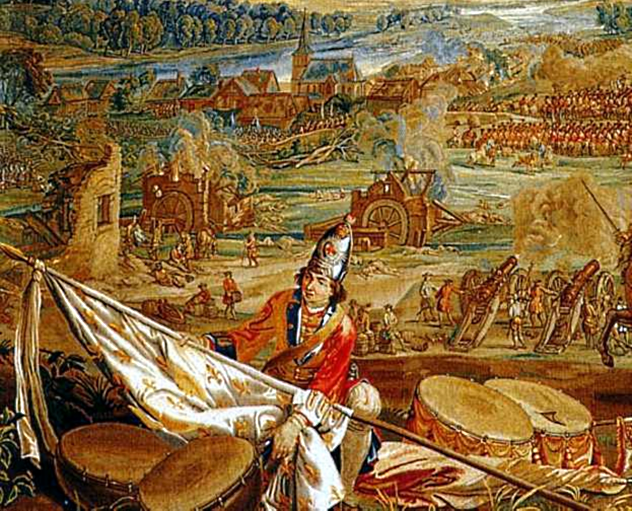
The ambitious Sun King, Louis XIV of France, had a long-standing rivalry with the Hapsburgs over who would be supreme in Europe. Nations east of the Rhine, as well as Britain, struggled to maintain the “balance of power” and to keep Louis in check. In November 1700, Charles II of Spain willed his throne to the Duke of Anjou, grandson of Louis. Acquiring Spain would make Louis’s house of Bourbon too powerful compared to the Hapsburgs, upsetting the balance. It was the signal for a general war to contain Louis. As the French armies advanced upon the Hapsburg lands, Britain’s John Churchill, Duke of Marlborough, organized a coalition of German states to stop them. The French decided to confront the allies on the Danubian village of Blenheim in Bavaria.
The years following the Thirty Years War were unique in military history. Sickened by the carnage of that war, commanders shunned open confrontation and preferred wars of sieges and maneuvers to keep casualties at a minimum. By the early 18th century, a general would be foolhardy to risk his troops in the face of the increasingly reliable and quick-firing muskets and cannons in open battle. The French, with their reputation for invincibility on the battlefield, were confident that the British would not dare to attack their strong positions at Blenheim. But in a bold move, Marlborough, who had already taken a great risk in taking the English so far from home, surprised the French when he launched his forces against the village. With perfect coordination from his ally, Prince Eugene of Savoy, Marlborough confused and overwhelmed the enemy with brilliant diversionary tactics, breaking their center and inflicting 40,000 casualties.
Defeat at Blenheim ended King Louis XIV’s ambition to rule Europe. Winston Churchill, Marlborough’s descendant, said that it “changed the political axis of the world” and marked the beginning of Britain’s ascendancy as a global power.
5 Poltava
1709
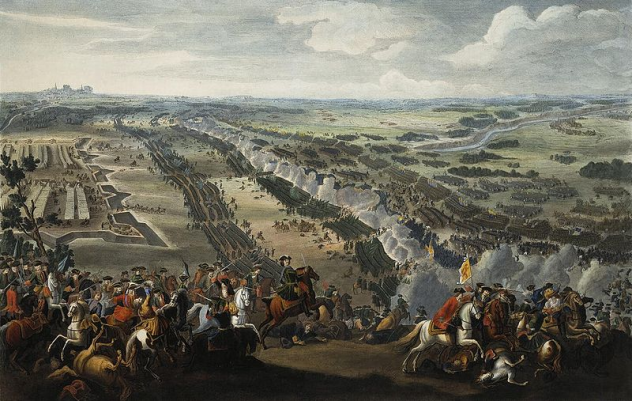
As the 18th century dawned, northern Europe saw a clash of ambitions between Sweden’s King Charles XII and Peter the Great of Russia. Charles ruled a great Baltic empire, which included Finland, Estonia, and Livonia. Peter, seeking an outlet to the sea, was determined to acquire ports on the Baltic in the north and the Black Sea in the south. Charles and Peter were on a collision course and finally met head-on in 1700, starting the Great Northern War.
Though numerically inferior, the Swedes managed to trounce the Russians at Narva early in the war. However, Charles failed to follow up his advantage, attacking Russia’s allies, Saxony and Poland, instead. The reprieve gave Peter time to rebuild his forces. After finishing his business with the Poles and Saxons, Charles turned his attention once again to Peter. Peter offered to return Russia’s conquests in exchange for keeping St. Petersburg. The confident Charles rejected peace and made the fateful decision to invade Russia.
Campaigning across the vast expanse of the Russian heartland is always risky. Both Napoleon and Hitler attempted it and failed. Before them, Charles and his Swedes tasted the bitter cold of the Russian winter as well as the enemy’s refusal of open battle and scorched-earth strategy when he attacked from 1708–09. Believing that only unrelenting pressure on the Russians could save him, Charles led his depleted force to lay siege to Poltava. In a final, desperate gamble, Charles tried to storm the Russian redoubts and was repulsed.
Sweden fell from being a major Baltic power, while Russia became the leading nation of northeastern Europe.
4 Frederick The Great Invades Silesia
1741
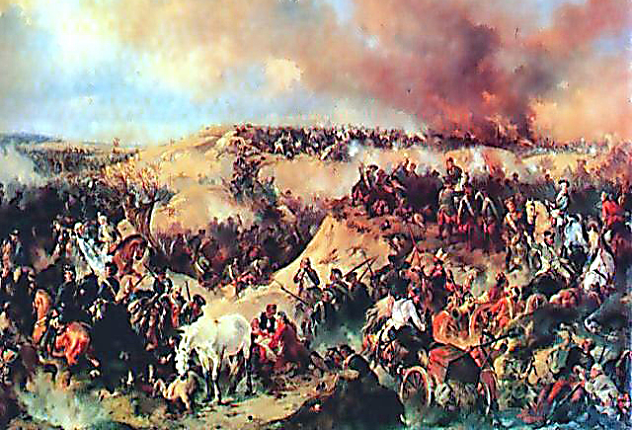
Frederick II became king of Prussia at about the same time that Maria Theresa ascended to the Austrian throne. Rather unchivalrously, Frederick took advantage of the young queen’s apparent vulnerability by invading the rich province of Silesia in 1741 and wresting it from Austria. His occupation of Silesia was uncertain at best, for Maria was determined to take it back. Allying Austria with France, Saxony, Sweden, and Russia, the queen prepared to oust Frederick. Prussia barely avoided total isolation by winning over Britain to its side. By the summer of 1756, Austria and her allies were ready to pounce on Prussia—Austria from the south, France from the west, Russia from the east, and Sweden from the north. The Seven Years War was on.
The luckiest man on this list, Frederick faced a powerful coalition against him because he thought he could get away with invading Silesia. Forced to fight multiple enemies on multiple fronts, Frederick was vastly outnumbered but managed to win some battles. However, he remained desperately on the defensive. In August 1759, the Austrians and Russians finally linked up, and the exhausted and despairing Prussians succumbed to an apparently decisive defeat at Kunersdorf, losing 18,000 men in six hours. The allies occupied Berlin, and Frederick contemplated suicide.
Then, sheer luck intervened. The allies failed to follow up their victory and deliver the killing blow. This was followed by the death of Empress Elizabeth of Russia, who was succeeded by Peter III, an admirer of Frederick who took Russia out of the alliance. This “Miracle of the House of Brandenburg” discouraged Austria from pursuing the war without Russia, and Frederick escaped with his Silesian booty.
Prussia became a major European power, its rise being the precursor to the rise of Germany and its career of conquest in the 20th century’s World Wars. It is fitting that the Seven Years War is sometimes called the very first world war. Britain, who mainly fought the war against France overseas, won colonial supremacy in North America and India, shaping the history of the future United States.
3 U-Boat Warfare
1917
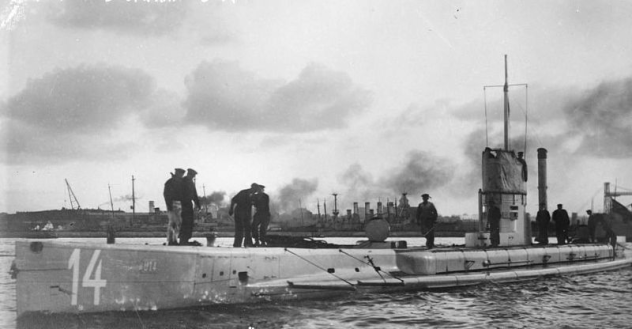
In World War I, Britain was dependent on Canada and the neutral US for its food and other supplies. In February 1915, Germany launched its U-boats against the merchant ships providing Britain with its Atlantic lifeline. Unrestricted submarine warfare entailed the risk of harming neutral vessels and lives as well, and the issue was a simmering one between the US and Germany, especially after the loss of 128 Americans when a U-20 torpedoed the liner Lusitania. Amid rising tensions, Germany called off its submarines in September.
It was a reprieve for the Allies at best. By 1917, the war was approaching its third year of trench deadlock, a conflict of attrition that had fed millions of men into the meat grinder that was the Western Front. Realizing the difficulty of breaking the Allies on land, the German high command decided to try to win the war at sea by resuming their sub attacks.
In February 1917, the ramped-up program of U-boat production had given the Germans enough firepower to completely cripple Allied shipping. Neutral ships with non-neutral cargo bound for Britain would not be exempt. This was a fateful decision, as the Germans knew it would bring America into the war. But they calculated that they could starve the British out first and win the war before the US could mobilize.
The gamble nearly succeeded. By April, when America declared war, over 1,030 merchant ships had been sunk. Britain was ready to keel over from starvation as her food reserves were due to run out in six weeks. It was a life-and-death matter to hang on until American help arrived. Britain indeed hung on as the Royal Navy implemented new anti-sub tactics such as protecting the convoys with destroyers. By September, the tide had turned on the Atlantic, and it was clear that Britain, and the Allies, would survive and win the war.
Defeated Germany became the womb of Nazism, and the punitive Treaty of Versailles became a cause of World War II.
2 Dien Bien Phu
1954
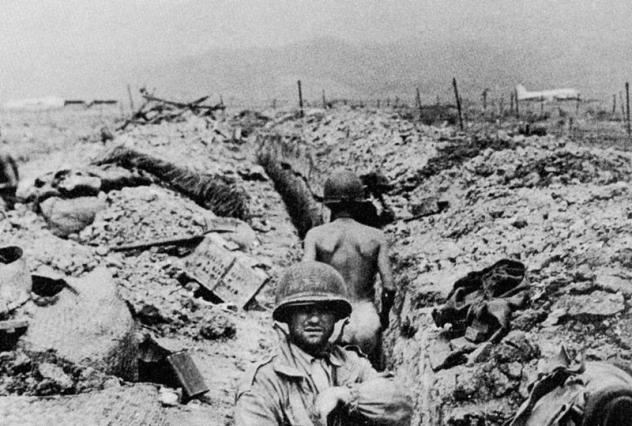
Ho Chi Minh and his Viet Minh began the war for Vietnamese independence from France in December 1946. By the 1950s, the Viet Minh had reduced the French to a defensive perimeter around the Red River Delta. But then, military aid from the US began to arrive, boosting the French position. In Geneva, a cease-fire conference was underway as the two sides were bogged down in a stalemate. The French needed to create a military advantage to retain clout at the bargaining table. The commander in chief, General Henri Navarre, knew the only way to do that was to beat the hardcore Viet Minh regular divisions.
Navarre decided to use his army as juicy bait. The plan was to lure the Communists out of the jungles and smash them in open battle. The ploy had worked once before, when General Vo Nguyen Giap tried to take the garrison at Na San by frontal assault and suffered horrible losses. The valley of Dien Bien Phu was chosen as the site of the French garrison because it was the door through which the Viet Minh must pass before they could invade Laos, which the French had sworn to defend.
But Navarre overlooked one thing: The roadless jungles of Indochina didn’t pose any difficulties for the Viet Minh, who supplied their frontline units through human porters. The enemy was able to haul up their artillery to bombard the garrison from the surrounding hills. Below the valley, the French were sitting ducks, their counter-battery work ineffective against the camouflaged and invisible Vietnamese. The only hope for supplies was by air, but Dien Bien Phu was at the limits of the air corridor, and Viet Minh anti-aircraft batteries hammered incoming transports.
One by one, the French strongholds fell. The last position was captured on May 7. The French were badly mauled, with 2,000 killed and over 10,000 taken prisoner. Only 73 escaped to the surrounding jungle.
France made a humiliating exit from Indochina, and an independent, communist North Vietnam was established. The US shortsightedly misread Vietnam’s struggle for freedom from a colonial power as part of a vast Communist conspiracy of expansion. The effort to “contain Communism” was the beginning of America’s woes in the region. US involvement in Vietnam would polarize the country and tarnish its image forever.
1 The Falklands War
1982
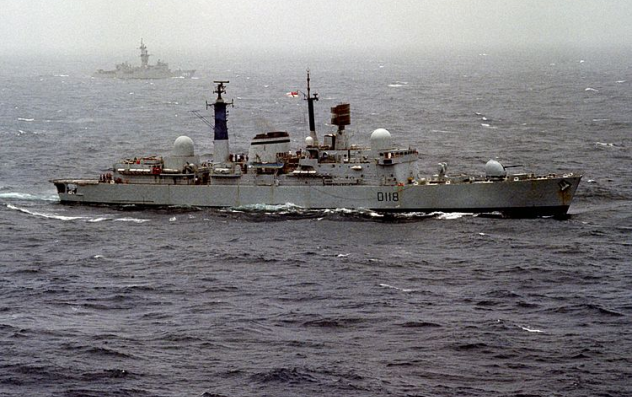
Britain was in the doldrums in the late 1970s. The economy lagged behind Germany, France, and Italy, and unemployment was high. Post-imperial retreat from overseas commitments characterized foreign policy. In barely three years of office, Prime Minister Margaret Thatcher had accomplished little beyond tax cuts for the rich and spending cuts for the poor. The Social Democrats were experiencing a surge. On April 2, 1982, the grim news came that Argentinian commandos had seized the British-held Falkland Islands. Facing possible resignation over the coup on top of her other woes, Thatcher was encouraged by Admiral Sir Henry Leach to assemble a task force to retake the islands.
With the Falklands 13,000 kilometers (8,000 mi) away and a sub-Antarctic winter looming, many thought the Royal Navy was on a fool’s errand. In the first place, the Navy was no longer equipped for expeditionary missions. There wasn’t even fleet airborne radar. Then there were the logistical difficulties of supplying the task force a third of the world away. Britain’s chief ally, the US, was against the war.
What followed seemed to confirm people’s fears. Nightly, the British public was treated to news of warships sunk, including the Sheffield, Coventry, Ardent, and Antelope. A single Argentine air raid killed 56 men and sank two more ships. In hindsight, most defense analysts have concluded that Argentina should have won had they awaited the South Atlantic storms and garrisoned the islands with well-trained troops and attack helicopters. In the end, the British prevailed, and the Argentines, unable to recover from their blunders, surrendered on June 14.
Britain’s victory over Argentina saved Margaret Thatcher’s reputation and her government. It arrested Britain’s slide to a third-rate power status and infused people with a new sense of pride. From being a nondescript politician, Thatcher was transformed into the forceful, decisive leader whom the world knows as “The Iron Lady.” In Argentina, it hastened the collapse of the dictatorship and a return to parliamentary democracy.
Larry is a freelance writer whose main interests are history and chess.
